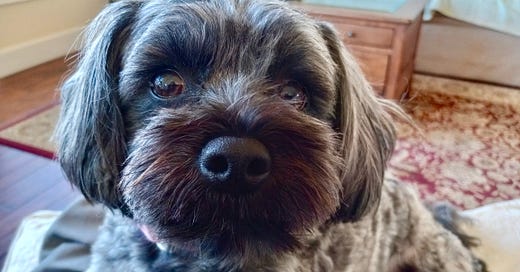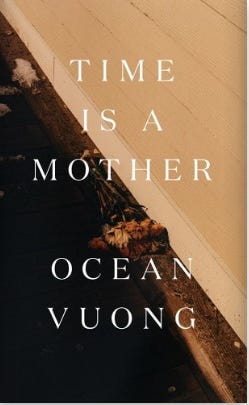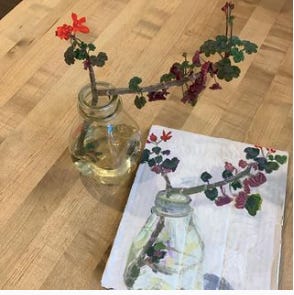Welcome! You’ve reached Spark. Learn more here or just read on. If you received this from a friend, please join us by subscribing. It’s free! All you have to do is press the button below
In this issue:
The work we love, the work we hate - can they be the same thing?
Nicole Chung explores how we gauge the importance of what we are doing; also her insightful TIME interview with poet Ocean Vuong about his own journey
Writing and money - a book of essays and interviews about the “art of making a living” from the written word
Let’s start with your work story
This week I wanted to leave the best job I’ve ever had even though it pays nothing and tortures me daily with insecurities and hopes unfulfilled. I’ll tell you about it but first, tell me a work story.
What’s the best, worst, weirdest or most unexpected job you’ve ever had? Did you find it or did it find you?
Do you have a quitting story - that time you spectacularly and dramatically walked away from a job?
Is there work you have done/would do/are doing for free? What is the pull?
So, this week…
After taking time off to visit with my son, I went back to work this week and found failure at every turn. I can’t tell you why it happened because I don’t know. It shocked me. It frightened me. I looked at the novel I’ve been working on with its thousands of words, disconnected chapters, characters I thought I knew, and it all looked wrong. Every day I sat down with the project and tried. Every day, I was confronted with a thick wall that seemed to have formed between me and the book; ideas could not get in, my thoughts kept bouncing off the barrier and splintering into irretrievable fragments. Worse, the story felt irrelevant, unimportant against all that is going on in the world right now. One day passed like that. Then another. Then another. And so on.
It wasn’t fun. Two other writers I admire announced their second books were accepted for publication. The joy I felt for them was real, but it came with a liberal dose of self-pity and envy. Not for the first time since beginning this project, I thought of simply stopping. I could put the novel down and walk away. I could stop writing altogether. The pull of that was so strong, so seductive. It was also terrifying because as bad as it was in the moment, I can no longer imagine a life without writing, or trying to.
You’d think I’d be used to this cycle by now – I’ve certainly cried on your collective shoulders before – but I’m not. Each time the fear and longing to just stop are real and the usual coping mechanisms fail me, at least for a time. It usually takes something to jolt me past the worst of it and this week it was the most recent newsletter, I Have Notes, by Nicole Chung.
In the newsletter, Nicole writes about writing, family, and friendship. She is a contributing writer to Atlantic Magazine and writes for TIME and others. Her memoir, All You Can Ever Know tells a gripping, nuanced story about growing up in a white family who adopted her as an infant, the reunion with her Korean birth family, and the coming to terms with the love and limitations of both families as she starts her own.
This week, her newsletter led with “When you aren’t sure your writing is important” which landed on the usual fears that had me in their grip: what if I can’t do this and what if I do it and no one wants it - which of course would be confirmation that I can’t do this.
All these years later, I still struggle with terms like important and necessary. These descriptors are beloved by publishers, spotted on book jackets alongside phrases like in this moment and now more than ever. Even when perfectly true, the follow-up question seems obvious: “important” to whom? Who’s open, who will happen across it, who may genuinely want or need to hear what a particular writer has to say? … one thing you quickly learn is that every piece of writing is nothing more or less than your very best shot at the time you take it: You cannot know if or where it will land. - Nicole Chung, “When you aren’t sure your writing is important”
She goes on to say that fear is part of the draw
The fear that I will fall short, that I will fail to convey my ideas in a way that resonates with readers, is real and ever-present, but I have realized that it is also part of the draw and the ongoing challenge….The hope, always, is just that those who are curious or care about many of the same things you do will be willing to accompany you for a little while, whether they are joining you in pursuit of some deeper understanding or simply swept up in the story you’re telling. Nicole Chung, “When you aren’t sure your writing is important”
The message wasn’t startling or new but it was reassuring and came from a person who has struggled in the same ways. It came at exactly the right time when I was feeling lost and alone and overwhelmed. It was enough to get me to lift my gaze from the mess in front of me and remember that I’d been here before and somehow had gotten a book out. Because of that book, I received two emails within a day of each other - one from a mother my age and another from a 17-year-old high school student who felt the story deeply and wanted to tell me it mattered. There were other nice moments but receiving those two emails from readers told me that something I thought was important was also important to them. I also remembered that discomfort, doubt, and even depression comes with the territory but they are not permanent or life-threatening.
Yesterday, the fog lifted. I don’t have any new chapters to show for it but I am ready to trust that if I show up, they will. So, for now, I’ll keep going.
Short Read: A Poet’s Journey
Poet Ocean Vuong spoke to Nicole Chung for TIME Magazine about his own relationship with the work he has chosen. The interview is a fascinating glimpse into the journey of a poet who came as a child from Vietnam, whose mother could not read the English words he was writing, and who thought, for a time, that he could study international marketing and earn more the kind of money that would help her. Instead, he dropped out because “I can’t fake it” and began the career path that he calls “serendipitous at every turn.”
In her interview, Chung describes the many opportunities when Vuong could have quit but didn’t. He worked hourly jobs, studied literature, and wrote poems. The poems made their way into books, he made his way into an MFA program, his work earned him the prestigious Whiting Award and a MacArthur “Genius” grant. Along the way he wrote the collection Night Sky With Exit Wounds, the heart-breakingly beautiful novel On Earth We’re Briefly Gorgeous, and now his third book, the collection Time is a Mother.
If my heart isn’t in something, I can’t do it, you know? Maybe that’s why I don’t have many drafts—by the time I get to the blank page, my heart is already there. That’s a limitation, in a way, but that’s also how I got here. Ocean Vuong to Nicole Chung, “Grieving His Mother’s Death, Ocean Vuong Learned to Write for Himself”
Turning Love into a Living
From 2013 to 2016, Manjula Martin published Scratch Magazine, a publication focused on making the relationship between writing and earning money from said writing more transparent. In 2017, she published an anthology of interviews and essays from the magazine, Scratch: Writers, Money, and the Art of Making a Living. It’s grounding and useful and entertaining and I will forever be grateful to Harald P. a member of this community, who gifted it to me.
In her introduction, Martin writes:
In every stage of their careers, working writers are in a constant state of negotiation: work and life, art and commerce, writing and publishing. In the public eye and within our communities, authors are said to practice a calling, an art form, a passion – but rarely a job. We are often told by more successful writers to “do it for the love,” but we are rarely told how to turn love into a living. – Manjula Martin
In fact, my writing has cost more money than it has ever made me. This compounds the feelings of doubt, discomfort, and depression that visit me as they did this past week. At times, even the unending support of those who love me feels like a burden because I am not producing during the time I could be devoting to them. At times I question whether I should call what I do “work.” After reading this book, I felt shored up enough to say yes, I am working. This is work. I love it. I am not making a living doing it. But I can’t stop. For now that has to be enough.
Okay, the week wasn’t all bad. There was this face…
So, tell me, how was YOUR week? Tell me how you are, what you’re reading and about the work that turns you on, turned you off, or anything else that is on your mind. If you’re looking for a book, check out the Spark Community Recommendations Page where you’ll find the books listed in this newsletter. Every purchase supports local bookstores. If we raise enough in commissions we will donate it to literacy programs chosen by all of us.
Ciao for now.
Gratefully,
Betsy
P.S. And now, your moment of Zen…Island art by Tanya Ward Goodman
One of the reasons I follow Tanya Ward Goodman’s Instagram feed is to see the paintings she makes of whatever is on her kitchen “island.” She shares her paintings along with pictures of her walks around Pasadena and L.A. When I saw this geranium practically taking root on her page, I felt still and calm and alive. You may remember Tanya’s essay from September 2021 in these pages: “Being A Little Less There.”
Calling for Your Contribution to “Moment of Zen”
What is YOUR moment of Zen? Send me your photos, a video, a drawing, a song, a poem, or anything with a visual that moved you, thrilled you, calmed you. Or just cracked you up. This feature is wide open for your own personal interpretation.
Come on, go through your photos, your memories or just keep your eyes and ears to the ground and then share. Send your photos/links, etc. to me by replying to this email or simply by sending to: elizabethmarro@substack.com. The main guidelines are probably already obvious: don’t hurt anyone -- don’t send anything that violates the privacy of someone you love or even someone you hate, don’t send anything divisive, or aimed at disparaging others. Our Zen moments are to help us connect, to bond, to learn, to wonder, to share -- to escape the world for a little bit and return refreshed.
I can’t wait to see what you send!








Betsy - I so relate to the writing struggle, having been doing it so many, many years. I've come so close a number of times, but just never get there. And that I write so slow, I find my emotional state and growth (or decline) mismatches the story. I'm at the point where I do not want to be traditionally published any more. After being with two very established and successful literary agents for years, I'm tired of trying (and I acknowledge my lack of success is my fault, not theirs). But I still have to do this thing. "Am I the real deal? . . ." I don't care anymore, especially in this current publishing environment. Everything is "LOOK AT ME! LOOK AT ME! LOOK AT ME!" "someone, please look at me". Of course I want to be read, but I want to write what is true to me, or how I see it, and realize I maybe wrong . . . and do it with high craft (or what I think is high craft). My family and friends do not like my writing, only the occasional stranger, the reader who doesn't know me. And sometimes I think, what the hell did these two agents see to keep me on so long? But I keep at it and love it and hate it, lazy, distracted bastard that I am. It's probably more a narcissistic delusion to keep the emptiness off - something I think I do well and have control over. Maybe, in part, pathological. Herman Melville is my hero and muse. His work was finally read extensively, just not in his lifetime; he didn't know what he would become and isn't around to enjoy it . . . And "Yes", the times and circumstances makes my writing feel vain and silly and stupid. I guess we always think the person that we are at the moment matters more than who we were - it must. I'm just a cranky old guy now.
Well - your post touched something in me as this is the most I've ever responded to an article. Don't know if I answered your question, but it got me thinking. As a side note, we're going back home for a visit in Portsmouth and Melvin Village at the end of May - an automatic decompression once back home. Be well.
I don't want to write about work, I want to write about writing. I've been sick since April 1 with a kidney infection, still recovering. For several days, I had a fever. During that time, I often lay awake, but too sick to get up. I wrote haiku in my head. I went over and over them so I would remember them and write them down when I was able to do so. The fever is over, but I can't yet recall those haiku. I trust they will return one day. Meanwhile, I have been able to write a couple of poems. My other writing is on hold. In my life I have written for money (as a journalist) and when I was writing for money somehow I always got the job done, and done on time. Without a paycheck, the writing takes longer, seems more "precious," but I carry on. There was a time in my life when I decided to "quit" writing. I took up gardening. Thank goodness for that time, because now I have both: writing AND gardening. I love watching life arise from the dirt, and flowers come into bloom.